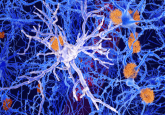New mechanism behind long term potentiation identified

Researchers from the University of Bristol (Bristol, UK) and the University of Central Lancashire (Lancashire, UK) have published a new study in Nature Neuroscience, reporting the discovery of a new mechanism that controls the way nerve cells communicate. This finding could have major benefits to understanding neurodegenerative disorders such as dementia and epilepsy. Long-term potentiation (LTP) increases the strength of nerve impulses transmitted across synapses. However, errors in this process can lead to a number of neurodegenerative disorders and symptoms. Previous research has indicated that LTP is regulated by NMDA receptors, but this new study reports a mechanism for LTP...





